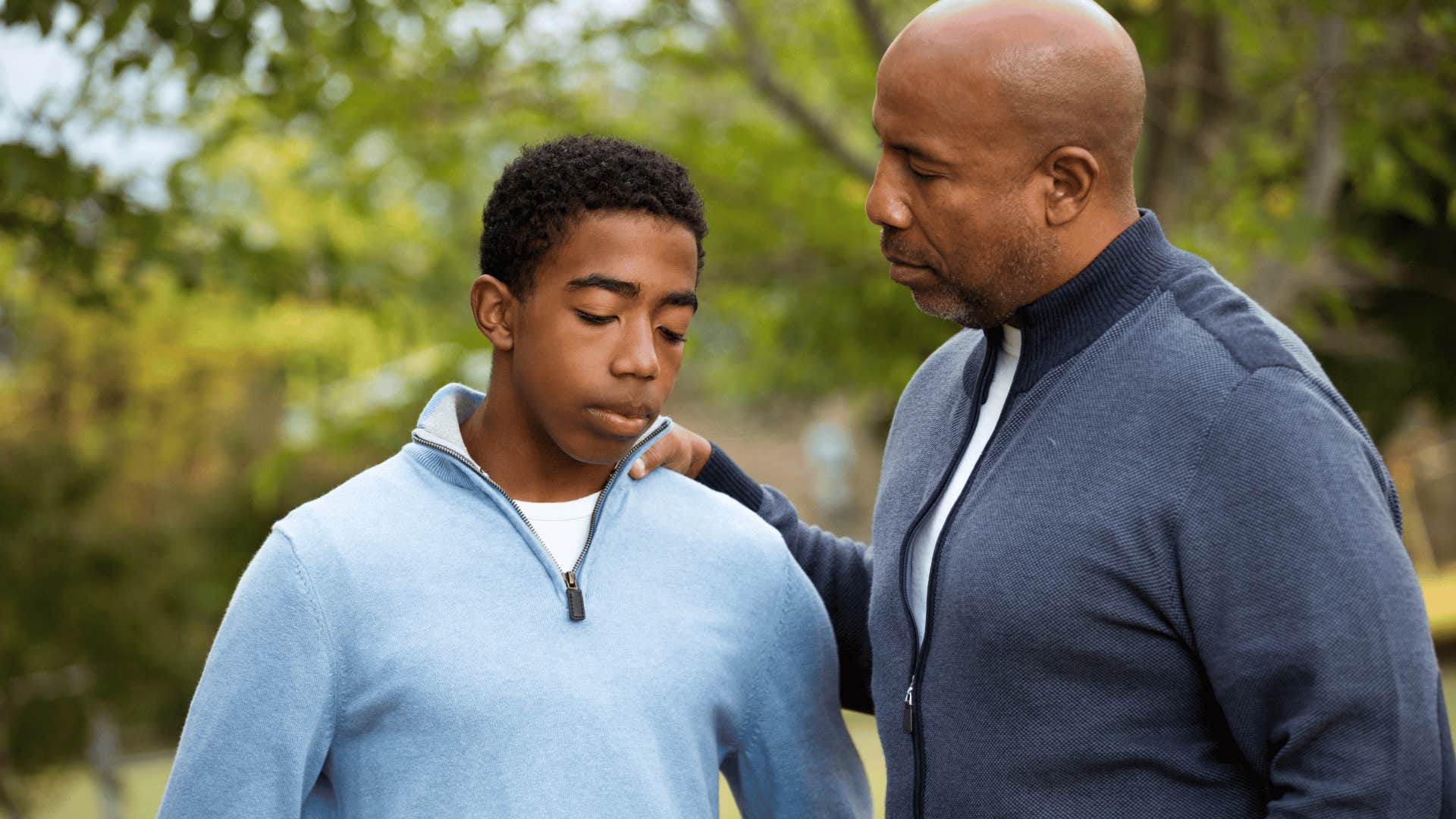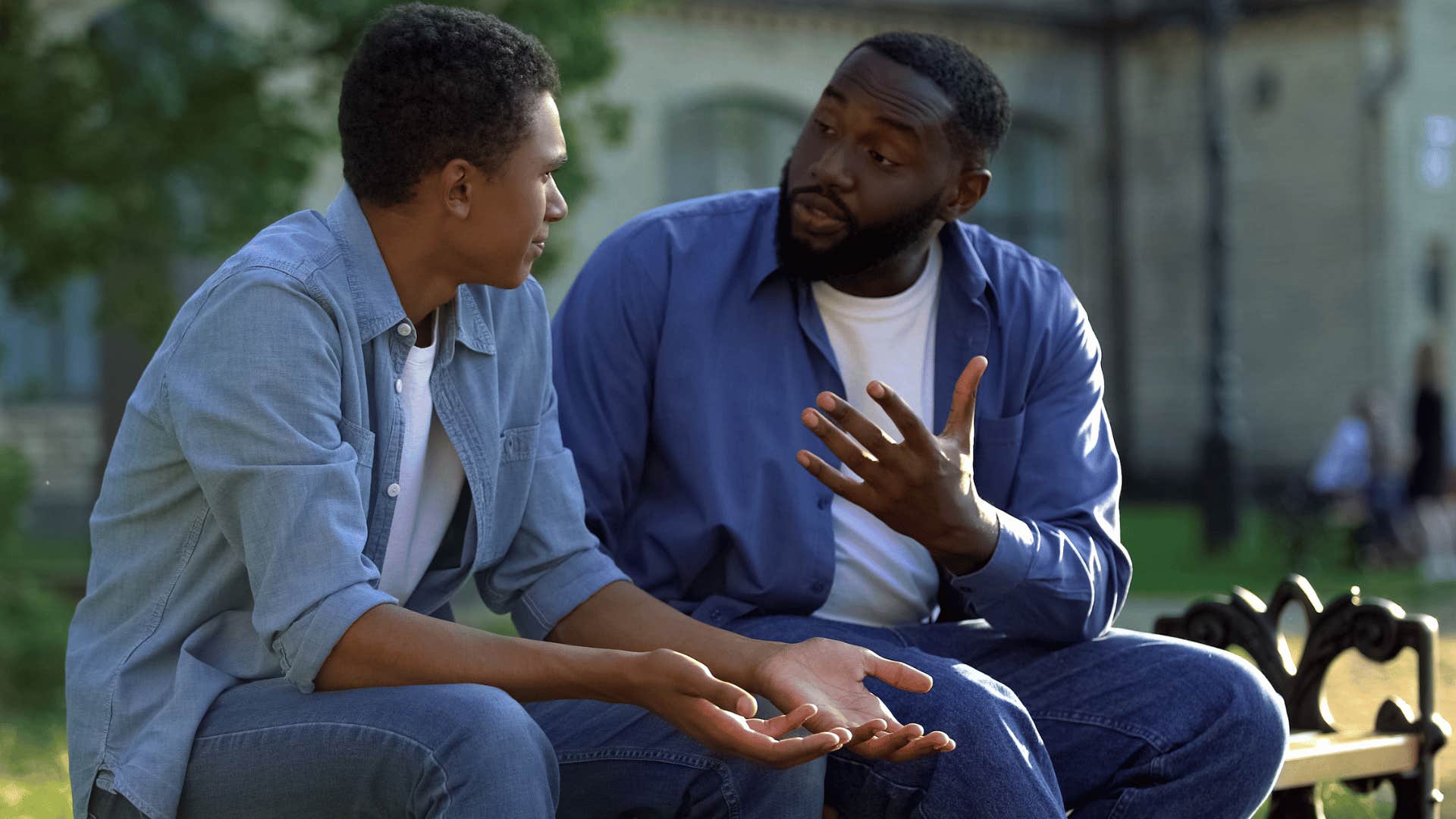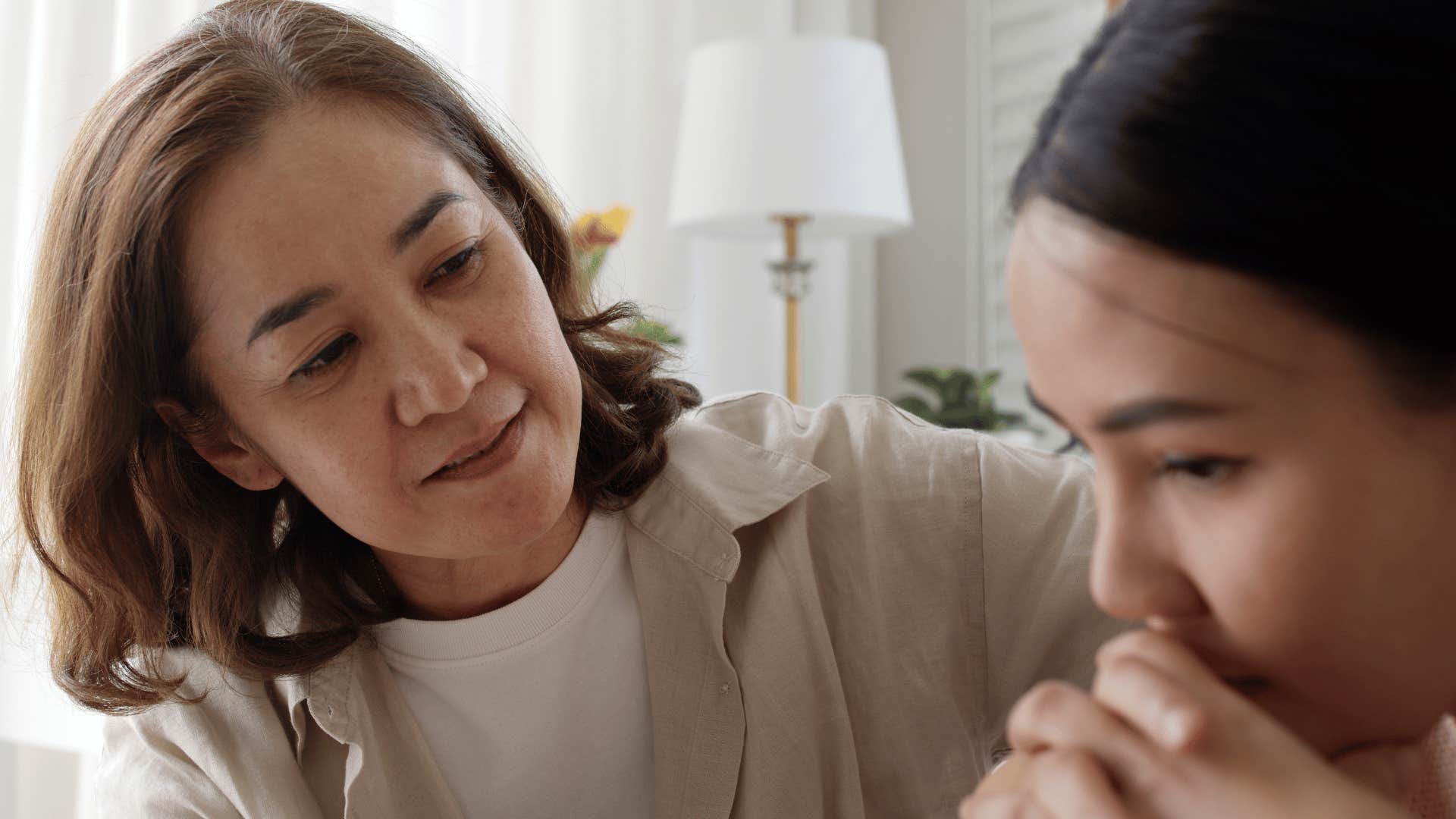Adult Children Who Refuse To Visit Their Parents Usually Have These 11 Reasons
When children stop visiting their parents, it usually isn't without good cause.
 GaudiLab / Shutterstock
GaudiLab / Shutterstock It’s natural for parents to experience a disconnect with their adult children when they leave home and start their own lives, but that doesn’t make it easy. With new expectations, experiences, boundaries, and frustrations to navigate, many family dynamics struggle with maintaining a healthy relationship characterized by productive conversation, empathy, and quality time.
However, adult children who refuse to visit their parents usually aren’t turned away by this natural disconnect, but rather the toxic behaviors and misguided coping mechanisms their parents adopt to cope with the stress of disconnection. From feeling unheard, to being disrespected, and not having a safe space to return to at home, adult children who don’t spend time nurturing relationships with their parents often use that energy to build more intentionally healthy connections.
Adult children who refuse to visit their parents usually have these 11 reasons
1. They don’t like a parent’s new spouse
 Prostock-studio | Shutterstock.com
Prostock-studio | Shutterstock.com
For adult children with separated or divorced parents, it can be challenging to craft a new family dynamic that feels supportive and comfortable — especially when you’re already struggling with managing time or finding free-time amid a chaotic schedule.
Especially for adult children who don’t like their parents’ new spouses, finding time to go home — when it feels like a tumultuous, annoying, or critical place — can feel like less and less of a priority.
2. Their parents are overly critical
 Fizkes | Shutterstock.com
Fizkes | Shutterstock.com
According to family therapist Jennifer Twardowski, overly critical people tend to hyper-focus on a person’s shortcomings — picking them apart, finding things to judge, and then playing the victim when the script flips. If a parent is only focused on what their adult children are doing wrong, giving them unsolicited advice and “solutions” to fix their problems, they’re never going to craft the safe space necessary to nurture a better relationship.
Adult children who refuse to visit their parents usually have a diverse set of reasons, but at the core, if they don’t feel supported or comfortable, that’s going to keep them from investing time and energy into the relationship.
3. They’re still treated like a child by their family
 Fizkes | Shutterstock.com
Fizkes | Shutterstock.com
Overbearing parents who lack control in their lives tend to struggle with the shifting expectations and experience of their kids entering adulthood — feeling overwhelmed by the disconnect and their lack of power and authority over their kids’ routines. To overcompensate, they still treat their adult children like kids when they come home, trying to solve their problems and provide misguided advice so they can feel “in control” and “important" for their kids.
Especially for parents who crafted their entire identity and sense of personhood around being a parent, having an adult child who no longer “needs you” for every passing task is disorienting, but the unhealthy ways they cope — from victim mentalities to guilt-tripping — only pushes their kids further away.
4. Their boundaries aren’t respected at home
 pixelheadphoto digitalskillet | Shutterstock.com
pixelheadphoto digitalskillet | Shutterstock.com
From disrespecting their privacy, to talking about their love life, and even inviting over manipulative and toxic family members, there are a number of ways parents can overstep their adult children’s boundaries, sometimes without even realizing it. These small missteps and mistakes can often be rectified, but when a parent sparks a pattern of behavior or actively dismisses their adult child’s communicated boundaries and expectations, that’s another story.
Of course, actually going “no-contact” with their parents and refusing to visit is incredibly difficult for many adult children — it’s not a passive or fleeting decision, like some people make it out to be. Like psychologist Dr. Lucy Blake says, it’s a challenging decision fueled by resentment, disrespect, and poor communication, but at the end of the day, it’s about protecting your wellbeing.
If your parents are constantly overstepping your boundaries, sabotaging your wellbeing, and dismissing your needs and concerns, sometimes creating more space and choosing not to visit is the healthiest thing you can do for yourself.
5. They feel ‘guilted’ into visiting
 Prostock-studio | Shutterstock.com
Prostock-studio | Shutterstock.com
According to psychologist Lynn Margolies, parents who lack self-awareness tend to rely on guilt-tripping phrases and behaviors to cope with the natural disconnect of their children entering into adulthood and starting their own lives. Rather than express their feelings of loneliness, they use phrases like “you never make time for us anymore” or “your life must be so good, you don’t need us” to guilt their kids into calling or coming over.
Of course, trying to spark guilt and shame in their kids for simply starting their own lives isn’t the way for them to close the gap or healthily cope with this disconnect — it only pushes their adult children farther away.
6. Their parents refuse to talk about childhood trauma
 Motortion Films | Shutterstock.com
Motortion Films | Shutterstock.com
It’s possible for a parent to emotionally support their adult child in talking about childhood trauma, even if they don’t share the same perception of the situation or disagree. However, according to a study from The Gerontologist, parents tend to note poor communication and conflict as two of the biggest drivers of tension in their relationships with adult children.
While both sides of this relationship can suffer from feeling unheard, misunderstood, or targeted, a lack of empathy is truly one of the reasons adult children refuse to visit their parents. Especially today, when so many adult Gen Zers and millennials are starting to acknowledge the link between their current struggles and their childhood experiences, it’s not surprising that there’s more conflict around talking about childhood trauma in parent-child relationships.
It can be uncomfortable to discuss, especially if both parties don’t “agree” with the other, but by leading with empathy, everyone gets a safe space to express their emotions and find healing without feeling targeted or judged for doing so.
7. They feel unheard
 Amnaj Khetsamtip | Shutterstock.com
Amnaj Khetsamtip | Shutterstock.com
According to a 2023 study published in PLOS One, feeling heard and understood in conversations is a pillar of healthy relationships — helping with effective conflict resolution, bonding, and growth, even between parents and their adult children. However, when a parent offers unsolicited advice when their children are looking for support, refuse to accept their differing opinions, or subconsciously invalidate them for being vulnerable, it drives a wedge between them in adulthood.
If you don’t feel appreciated by a friend or a partner, you don’t continue to nurture that relationship. However, so many people feel a pressure to stick around and tolerate misbehavior from family members, over-and-over again.
Adult children who refuse to visit their parents, especially those that continue to dismiss their needs and overstep their boundaries, take matters into their own hands — investing energy into the connections and relationships that add value to their lives, rather than take it away.
8. Their parents refuse to take accountability
 ViDI Studio | Shutterstock.com
ViDI Studio | Shutterstock.com
Whether it’s current emotional manipulation or childhood trauma, parents who refuse to take accountability around their adult children often encourage them to feel unheard and invalidated.
Of course, parents who refuse to take accountability also tend to engage in enabling behaviors, like psychologist Jeffrey Bernstein suggests, that can sabotage personal growth, responsibility, and empathy in their children, as well.
It’s important to find a healthy balance for adult children and their parents, otherwise both sides can interfere with the other’s life in ways that spark resentment, disconnect, and mistrust.
9. Their parents lack empathy
 Chay_Tee | Shutterstock.com
Chay_Tee | Shutterstock.com
A lack of empathy can manifest in a variety of ways in a parent-child relationship — think: victim blaming, guilt-tripping, gaslighting, not listening, etc — but it often comes back to kindness. Do you feel like your parents are kind? Do they treat you in a kind manner when you’re speaking? Do you feel valued and appreciated by them?
If an adult child answers “no” to any of those questions, that could be fueling them to spend less and less time with their parents.
Especially navigating the newness and change associated with early adulthood, having a stable parent and safe space at home to support is essential — if their parents are doing the opposite, sabotaging their wellbeing and adding stress to their lives, that’s likely one of the reasons they’re creating distance.
10. Their parents are overly dependent on them
 Gladskikh Tatiana | Shutterstock.com
Gladskikh Tatiana | Shutterstock.com
Parents who lack control or self-esteem in their own routines may rely on their kids to feign a sense of normalcy, but when they enter adulthood and move out of the house, that overly dependent nature can manifest itself in more unfortunate and manipulative ways.
From trying to control their life decisions, to solving their problems rather than supporting, and struggling with respecting their adult children’s boundaries, co-dependent parents sabotage the natural disconnect and space a healthy family dynamic needs to survive later in life.
11. Everything is always an argument
 Pheelings media | Shutterstock.com
Pheelings media | Shutterstock.com
According to a study published in the Couple and Family Psychology journal, many parents and adult children feel disconnected from each other because of poor communication. Many are even conscious of it — arguing that shifting societal norms, politics, mental health discussions, and other “hot topic” areas of discussion have added a strain on their relationship, making it hard to have open, honest, and empathetic conversations.
When everything is emotional, stressful, or controversial — and you don’t have the emotional regulation skills or communication skills to navigate it — everything's an argument. It’s not fun for anyone and it only encourages both parents and their adult children to associate the other with stress or emotional turmoil.
Zayda Slabbekoorn is a staff writer with a bachelor’s degree in social relations & policy and gender studies who focuses on psychology, relationships, self-help, and human interest stories.

